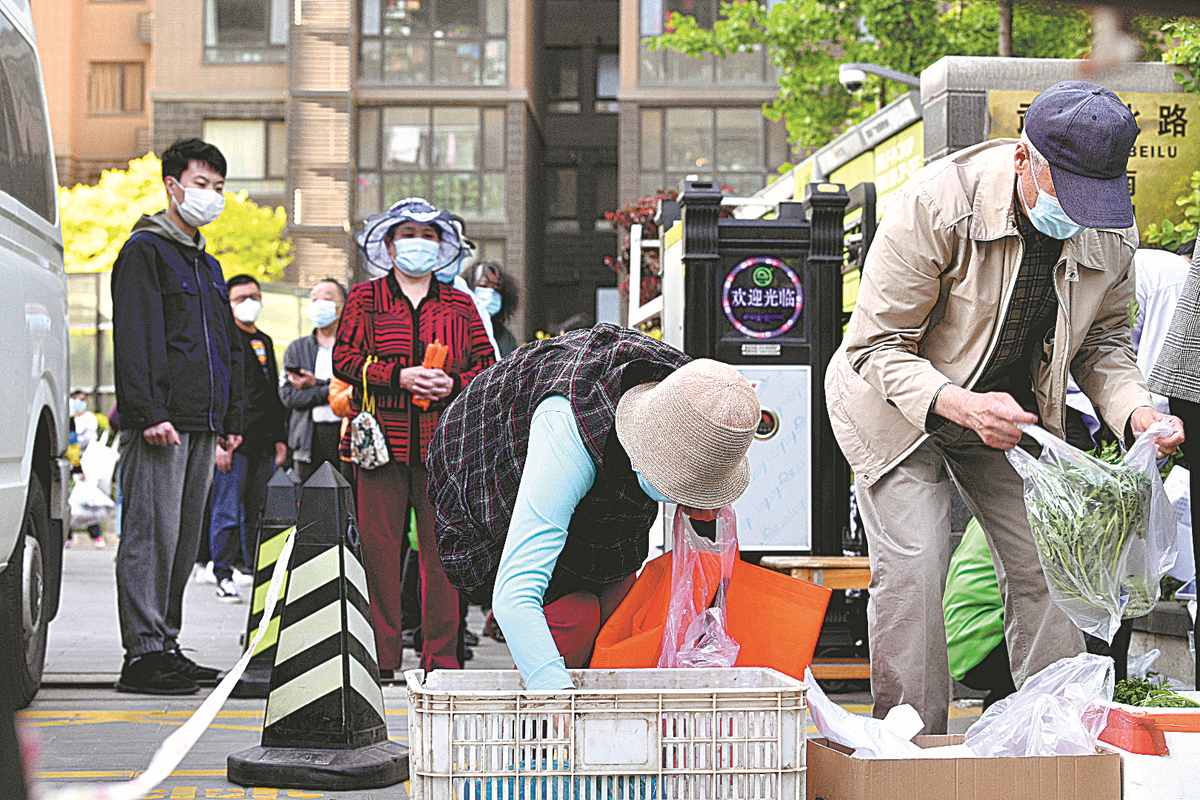Beijing unites to ensure supplies during COVID-19 outbreak


Swift action
Even though residents initially rushed to supermarkets to buy food, resulting in some empty shelves on April 24, the municipal government was quick to announce a series of measures to ensure supplies reached customers.
Next morning, residents found supermarket shelves full of food.
Zhao Weidong, deputy head of the city's commerce bureau, said at a news conference on April 25 that supermarkets had stocked up with double or triple the usual amount of daily goods-especially vegetables, eggs, fruit and meat-to cope with rapidly soaring demand.
"The city's supplies of daily goods are sufficient and prices are stable," Zhao said in a statement.
The commerce bureau said early last month that Beijing had enough reserves of daily necessities for the public, adding that supervision had been strengthened to ensure the prompt delivery of supplies to stores.
In addition to the lead taken by the authorities, State-owned and private enterprises are playing active roles in ensuring that supplies get through.
Xinfadi wholesale market in the city's Fengtai district, which supplies about 80 percent of Beijing's agricultural produce, swiftly stepped up supplies of vegetables from neighboring provinces.
Tong Wei, secretary to the market's president, said Xinfadi has sufficient stocks and a mature supply chain to ensure adequate supplies of agricultural produce for the city. The market is supplying more than 20,000 metric tons of vegetables daily to meet growing demand, Tong added.
Chaoyang, the district most affected by the latest COVID-19 outbreak, had registered more than 300 confirmed cases by Wednesday. Since April 25, the district has implemented a 24-hour stocking system, and its scores of supermarkets and food stores are replenishing stocks three to five times more than usual.
Since April 24, Wumart, a supermarket chain with many outlets in the Chinese capital, has extended its opening hours until the last customer leaves, while Carrefour has tripled its stocks.
Shi Tingfeng, an assistant manager at Carrefour's Shuangjing store in Chaoyang, said he finishes work at 2 am after restocking the shelves with colleagues, according to Beijing Business Today.
Food purchasing platforms, including Hema Xiansheng and Meituan, have extended their delivery hours to 24 hours a day in Beijing to ensure customers receive orders quickly.
In response to the soaring number of orders, Meituan strengthened its Beijing warehouse's distribution capacity, increasing stocks three to five times more than the usual level.
Liu Muhua, a manager at Meituan's Panjiayuan store in Chaoyang, said, "We have received more than 500 orders an hour in a morning recently, which seldom happened before.
"I replenish our stocks three times a day and I am going to work two hours earlier than usual."
As many residential communities in the city have been designated lockdown and controlled zones, where residents cannot leave unless it is absolutely necessary, numerous people are cooking at home.
In addition to the municipal government requiring restaurants in Chaoyang and other areas at risk to suspend dine-in services to avoid infection risks, many outlets have adopted takeout services for customers.
Xiabuxiabu Restaurant Management Co, which operates about 300 hot pot outlets in Beijing, said it has increased its takeout delivery service to meet demand.
The company said it had experienced a steady rise in the number of takeout orders since late last month. It has also increased stocks and prepared for a full resumption of work and production after the outbreak is contained.
Meanwhile, the apartment block in which Li Yuanlong, 32, lives in Tongzhou district was placed under controlled management for a week at the start of this month after a close COVID-19 contact was traced to the building.
Li, who seldom cooks, said he ordered takeout food for a week and it was always delivered promptly.
"I never expected to eat takeout hot pot alone at home, and I also ordered a cup of milk tea to cheer myself up during this special period," he said.
"I have never resorted to panic buying, as I believe Beijing is well equipped to cope with this situation."
Li and other residents are now allowed to leave their community, but he cannot go to his workplace, as it is located in Chaoyang, where the government has asked people to work from home.
He uses online apps to order food each day, and said he has experienced no problems, as numerous choices are available.
























